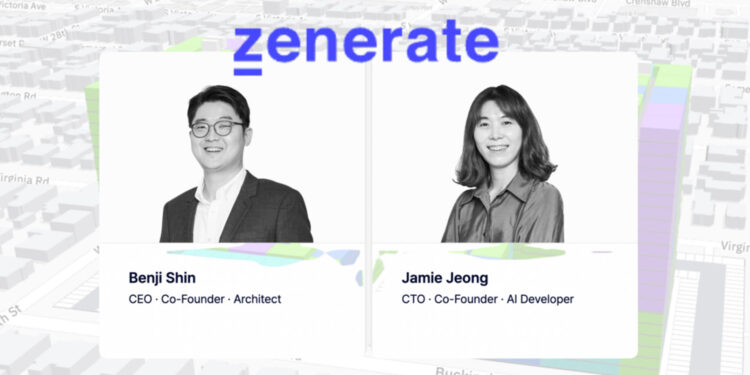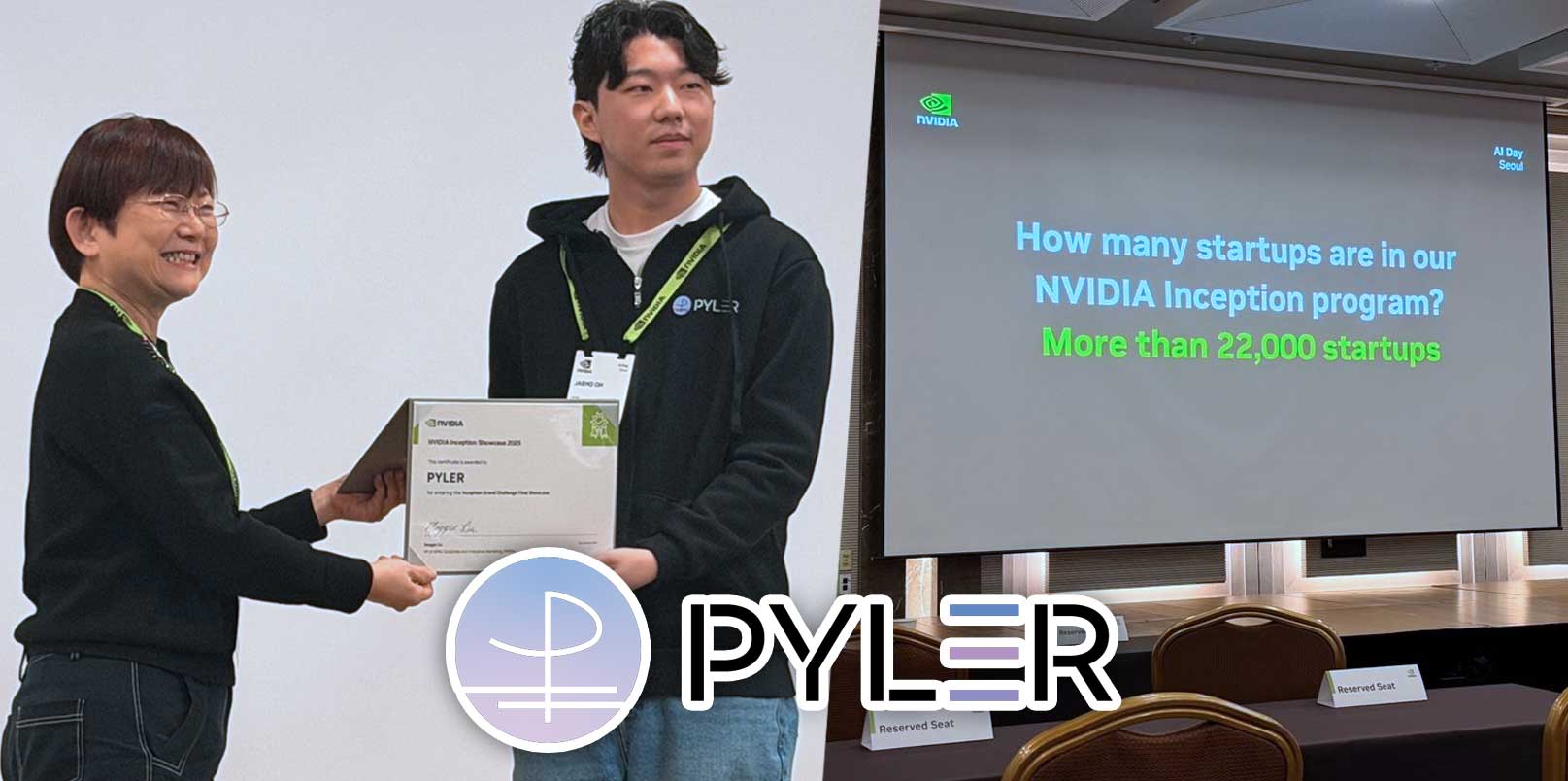What if you could design smarter buildings in minutes instead of months—and boost returns while doing it? That’s the vision behind Zenerate, a proptech startup transforming the way real estate developers approach the early design phase.
Founded in 2020 by Benji Shin, a former architect in Los Angeles, and his long-time friend Jamie Jeong, a PhD in mathematics from Caltech, Zenerate blends deep domain knowledge with cutting-edge AI. What began as a passion project to automate feasibility studies has now grown into a full-fledged platform helping developers maximize returns—right from the pre-development stage.
After proving their concept with a student housing project at the University of Southern California, the duo turned their idea into a company. Since then, they’ve secured multiple rounds of funding, gained recognition as the first proptech company in the Korea AI Startup 100, and expanded across Korea and the U.S.
In this interview, we talk to the Zenerate team about their journey, the power of generative AI in real estate, and what the future holds for proptech.
Q. What inspired you to start Zenerate, and how has your mission evolved?
While working as an architect on high-rise residential projects, I encountered significant inefficiencies in conducting feasibility studies. I often had to create multiple design options from scratch whenever clients requested alternatives to explore better financial performance. To streamline this process, I teamed up with a couple of friends who could code, and we began developing a tool that could automatically generate thousands of high-rise building design options along with their financial proformas. Fortunately, we had the opportunity to apply it to a real project—USC student housing—and realized this approach could represent the future of architecture. That experience inspired us to start our own company.
Q. Zenerate was selected as the first-ever proptech startup in the Korea AI Startup 100. What did that recognition mean for your team, and how did it affect your visibility or growth?
We were incredibly humbled and excited to be recognized among the top 100 AI startups. At the time, we had just begun fully focusing on the U.S. market and realized that, not just in the States but globally, there were no competitors leveraging AI the way we were. This recognition gave us even more confidence in building what we believe has the potential to change the world.
Q. As a young startup, what were some early milestones that helped you gain traction quickly in both Korea and the U.S.?
In Korea, we initially provided only consulting services, as we didn’t have any software at the time. Through my university network, I was able to connect with top-tier real estate development and construction companies, which significantly helped us secure some of our first deals. In the US, our first product was Zmaps, a tool that provided up-to-date information on real estate development projects in Los Angeles. People loved the data and the clean, user-friendly design, especially in contrast to the outdated and difficult-to-navigate government websites they were used to.

Q. Can you explain how the Zenerate App works in simple terms? What makes it different from traditional real estate planning tools?
Our product enables users to quickly conduct feasibility studies for real estate development projects. You simply locate your site on the map, enter the zoning requirements and project goals such as the desired number of apartment units and maximum floor area, and click “Generate” to create multiple building design options that meet those criteria. Users can easily compare the financial proformas of the generated options and manually adjust the floor plan layouts as needed. Finally, everything can be exported as a PDF report, Excel file, or into Revit or CAD formats.
Q. You mention Zenerate helps developers achieve up to 28% higher returns. What kind of feedback or real-world results have you seen so far?
Achieving these results was made possible through our consulting services. The logic is simple: generate a large number of design options, apply realistic premiums such as higher apartment prices for better views, greater height, and improved daylight, and then compare the financial outcomes. Most of our clients understood this approach and greatly appreciated our service. However, a few believed they could do better themselves, likely because they did not fully understand or accept the new technology. It has now been four years since then, and almost everyone recognizes that AI can perform better than humans in this area and is more willing to embrace it.
Q. Real estate involves both data and creativity. How does your platform balance between AI automation and the human side of development?
The results generated by our engine do not always meet users’ expectations. When we first launched the product, it only offered design generation, and we received feedback that users wanted the ability to modify the results to better suit their needs. Since the generated designs are not perfect and cannot precisely match every user’s expectations, we realized the importance of adding editing functionality. You can think of it like ChatGPT: it generates an initial output, but allows users to edit or regenerate to better fit their request. In summary, we offer both design generation and editing features to strike a balance between AI automation and human input.
Q. You’re active in both the U.S. and Korean markets. What are the biggest differences in how real estate tech is adopted in these two regions?
In Korea, software is often not seen as something worth paying much for, and many people prefer free solutions. In contrast, in the US, users are generally more accustomed to paying for even small tools, such as payroll or timesheet software. The speed of adopting new technology and the overall appreciation for its value are significantly higher in the US market compared to the Korean market.
Q.Proptech is still growing in Korea. What do you think are the main challenges—and also opportunities—for this sector?
It’s hard to find a solution for this, but I believe the biggest problem is the small size of the market. There have been a few companies that created amazing technologies and services, yet they didn’t succeed. I think one of the main reasons for their failure is the limited market size. From the beginning, Korean proptech startups must target the global market.
Q. What advice would you give to other founders working on deep tech or AI solutions in more traditional industries like real estate?
We have learned and are still learning that making changes with technology in this very traditional industry is really hard and very slow. I think starting with a small scope could be a good approach. Focus on a small, essential part of the workflow and try to replace it with your service.
Q. Where do you see Zenerate heading in the next five years? What role do you think AI will play in the future of real estate development?
Thanks to today’s AI, things are changing much faster than everyone expected. Therefore, I believe the problems many startups are trying to solve will also be resolved by technology in the real estate development space. Specifically, you won’t need to read thousands of zoning laws, wait for designers to provide several design options, or hire estimators to get a more accurate construction quote, as AI will provide these in real time. In this circumstance, our product will evolve to fully support the feasibility study phase of a development project and further become involved in the actual design process to streamline the entire workflow.
Keep tab on latest news in the Korean startup ecosystem & follow us on LinkedIN, Facebook, and Twitter for more exciting updates and insights.






